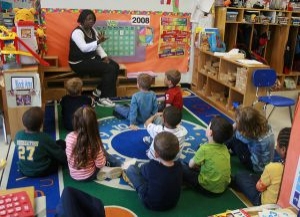

Neurodivergence refers to natural variations in how brains process information, emotions, and social interactions. In early childhood, this may include children with autism, ADHD, dyslexia, dyspraxia, or other neurological differences.
Autism Awareness Australia (AAA) and the ECEC Professional Learning program have launched a short, online, fee-free microskill course designed to give NSW early childhood professionals the tools they need to better support autistic children in their service.
Autism in young children, often referred to as Autism Spectrum Disorder (ASD), is a developmental condition that affects communication, behavior, and social interaction. Supporting children with autism in early childhood services involves creating an inclusive and nurturing environment tailored to their unique needs. The following article provides information on Key Strategies To Support Children With Autism , Individual Learning Plans , ILP In Action, Sensory-Friendly Spaces, How Can Educators Adapt Their Teaching Methods For Autistic Children?, Involving Families With Children With Autism and more.
‘Navigating Autism: The Early Years’ is a free online training program designed to empower early childhood educators supporting autistic children with practical tools and strategies to support autistic children.
Australian researchers have developed a screening tool to find out the children who are on the autism spectrum. This seems to be the most successful tool to detect autism around the world. A study of more than 13,500 Victorian children found the la Trobe university tools most effective in the world.
 Working as a childcare professional can be a challenge especially when dealing with behavioural problems which may arise. The techniques we use when dealing with… Read More
Working as a childcare professional can be a challenge especially when dealing with behavioural problems which may arise. The techniques we use when dealing with… Read More
 There are different types of behaviour that children can display and sometimes it can be hard to manage, especially if a child is having behavioural… Read More
There are different types of behaviour that children can display and sometimes it can be hard to manage, especially if a child is having behavioural… Read More
 As a parent, your behavioural expectations of your child can be higher than what is actually developmentally appropriate for your child's age.
Read More
As a parent, your behavioural expectations of your child can be higher than what is actually developmentally appropriate for your child's age.
Read More
 As Educators, there will be many instances where you will need to write about a child's behaviour. For a behaviour management plan, assessments, half-yearly or… Read More
As Educators, there will be many instances where you will need to write about a child's behaviour. For a behaviour management plan, assessments, half-yearly or… Read More
 As Educators when communicating with Parents (through verbal or non-verbal communication), there will be times where we need to discuss issues or concerns that may… Read More
As Educators when communicating with Parents (through verbal or non-verbal communication), there will be times where we need to discuss issues or concerns that may… Read More
 Challenging Behaviour is when a child does something that hurts themselves and/or other people.
Read More
Challenging Behaviour is when a child does something that hurts themselves and/or other people.
Read More
 As part of your child's development it is normal for your child to have anxiety and fears. A baby commonly shows a fearful sign to… Read More
As part of your child's development it is normal for your child to have anxiety and fears. A baby commonly shows a fearful sign to… Read More
 It's always difficult to bring up behavioural issues with parents, it can be nerve wrecking to tell a parent that their child misbehaves but that… Read More
It's always difficult to bring up behavioural issues with parents, it can be nerve wrecking to tell a parent that their child misbehaves but that… Read More
 All children deal with anger on a daily basis. Thinking about it as a child, there is a lot to be angry about. Elder people… Read More
All children deal with anger on a daily basis. Thinking about it as a child, there is a lot to be angry about. Elder people… Read More
 It is important to understand that your child behaviour problems could not just be from attention seeking. There are many factors to take into consideration… Read More
It is important to understand that your child behaviour problems could not just be from attention seeking. There are many factors to take into consideration… Read More

The development of writing skills depends on a variety of physiological and environmental factors. Children...
See more...
Caring for babies in their gross motor development stage involves encouraging activities that promote strength...
See more...
As part of your child's development it is normal for your child to have anxiety...
See more...© 2009-2025 Aussie Childcare Network Pty Ltd. All Rights Reserved.

